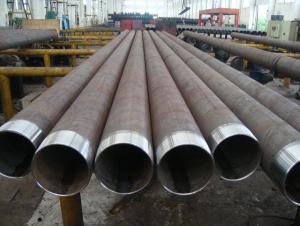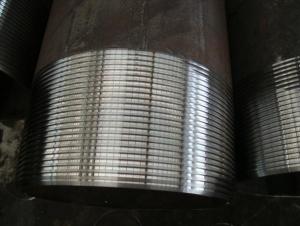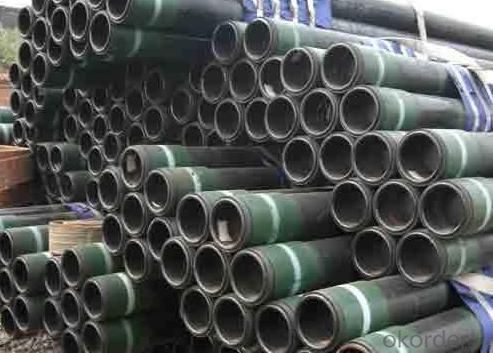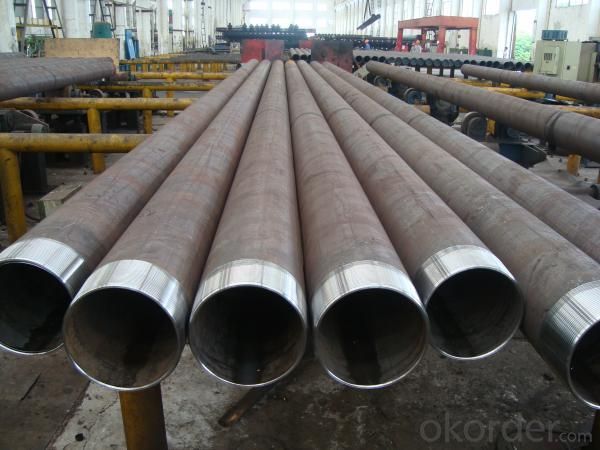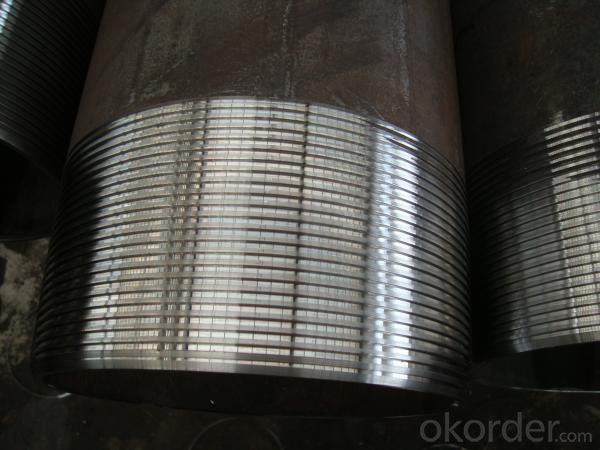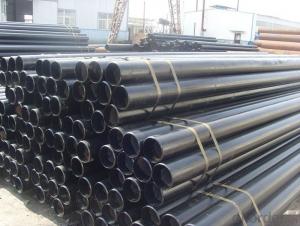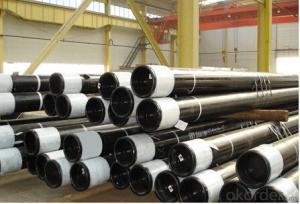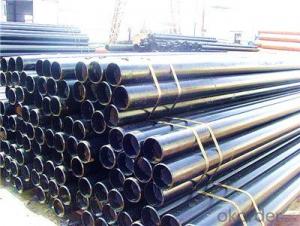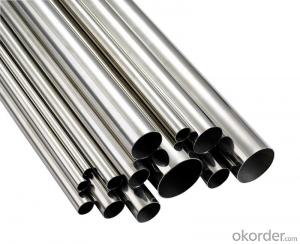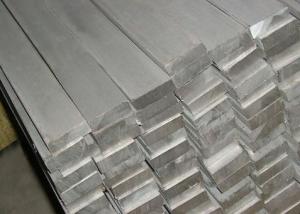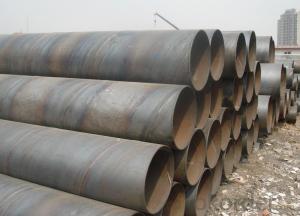Oil Tubing / Petroleum Pipe
- Loading Port:
- Baoshan Port
- Payment Terms:
- TT or LC
- Min Order Qty:
- 50MT m.t.
- Supply Capability:
- 5000 Tons Per Month m.t./month
OKorder Service Pledge
OKorder Financial Service
You Might Also Like
1. Outside Diameter of Oil Tubing / Petroleum Pipe
For upset pipe, the following tolerances apply to the outside diameter of the pipe body immediately behind the upset for a distance of approximately 127 mm (5.0 in) for sizes Label 1: 5-1/2 and smaller, and a distance approximately equal to the outside diameter for sizes larger than Label 1: 5-1/2. Measurements shall be made with callipers or snap gauges.
|
Label 1 |
Tolerances behind meuor L0 |
|
£3-1/2 |
+ 2.38 mm to – 0.79 mm (+ 3/32 in to – 1/32 in) |
|
|
|
|
>3-1/2 to £5 |
+ 2.78 mm to – 0.75% D(+ 7/64 in to – 0.75% D) |
|
|
|
|
>5 to £8-5/8 |
+ 3,18 mm to – 0,75% D(+ 1/8 in to –0.75% D) |
|
|
|
|
>8-5/8 |
+ 3,97 mm to – 0,75% D(+ 5/32 in to – 0.75% D) |
|
|
|
For Label 1: 2-3/8 and larger external-upset tubing the following tolerances shall apply to the outside diameter at distance La(see Figure D.5) from the end of the pipe.
The measurements shall be made with snap gauges or calli pers. Changes in diameter between Laand Lbshall be smooth and gradual. Pipe body OD tolerances do not apply for a distance of Lbfrom the end of the pipe.
|
|
Label 1 |
Tolerances |
|
|
|
|
|
|
³2-3/8 to £3-1/2 |
+ 2,38 mm to – 0,79 mm (+ 3/32 in to – 1/32 in) |
|
|
|
|
|
|
>3-1/2 to £4 |
+ 2,78 mm to – 0,79 mm (+ 7/64 in to – 1/32 in) |
|
|
|
|
|
|
>4 |
+ 2,78 mm to – 0,75% D(+ 7/64 in to – 0.75% D) |
|
|
|
|
|
2. Wall thickness of Oil Tubing / Petroleum Pipe |
| |
|
Tolerance – 12,5% |
| |
|
3. Mass of Oil Tubing / Petroleum Pipe |
| |
|
Amount |
Tolerance | |
|
Single lengths |
+ 6.5% to – 3.5% | |
|
Carload 18 144 kg (40 000 lb) or more |
– 1.75% | |
|
Carload less than 18 144 kg (40 000 lb) |
– 3.5% | |
|
Order items 18 144 kg (40 000 lb) or more |
– 1.75% | |
|
Order items less than 18 144 kg (40 000 lb) |
– 3.5% | |
Details picturers of Oil Tubing / Petroleum Pipe shown as below,
Package:By Strip.Black painting ,plastic caps,marks on pipe body.
We are also a manufacturer,so we can provide the products in conformity with your requirements rapidly.
Our products is accord with the standard of API 5L, API 5CT of American Petroleum Institute,the standard of ASTM A252,ASTM A53 and ASTM A500 of American Society Testing and Materials and standard of EN10217 and EN10219 of the European Union and passed the certification of ISO90012008 International quality management system.
Production line,imported equipment with high technology to low down cost,so we offer low price with good quality.
Our company has rich technical force and advanced production equipment and coordinated advanced test equipment and method.
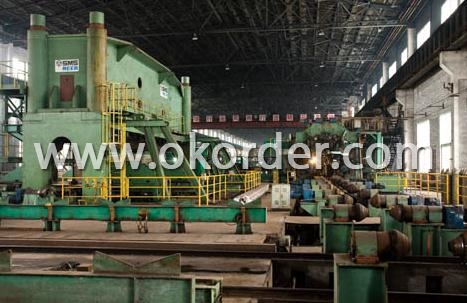
Advanced production line.Ensure good quality.
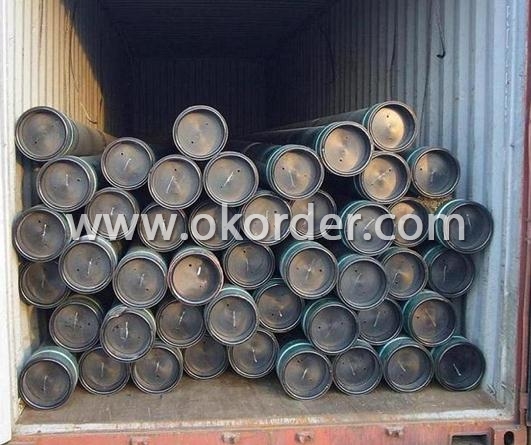
Container loading,professional and experienced service team for clients to ensure no damage.
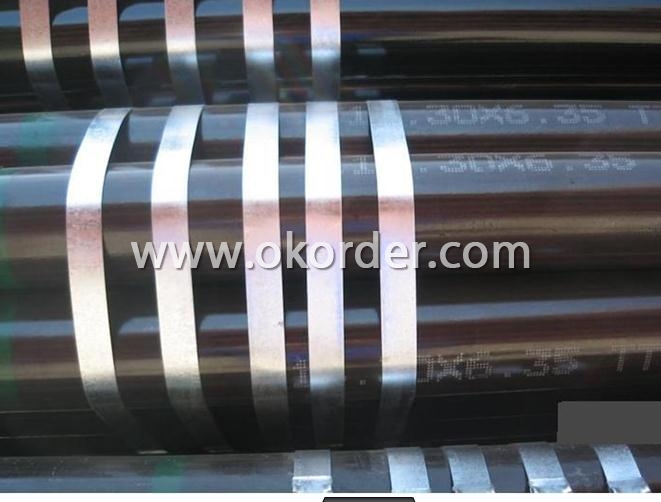
With steel strip to make sure good condition.
Welcome to order from us for Oil Tubing / Petroleum Pipe.
We will be happy to give you a excellent quotation according to your detailed requirements.
- Q: Can galvanized steel tubes simmer?
- Galvanized pipe bending is one of the elbow, the surface of the pipe is coated with a layer of zinc material to improve the corrosion resistance of the elbow. Galvanized pipe bending hot galvanized and galvanized two kinds, hot galvanized, zinc coating thickness, zinc plating cost is low, the surface is not very smooth. Galvanized pipe bending cold tube, hot tube, the former has been banned, and the latter is also advocated by the state for the time being.
- Q: What is the maximum length of steel pipes available?
- The maximum length of steel pipes available can vary depending on the manufacturer and specific application. However, steel pipes can typically be found in lengths ranging from 20 feet (6 meters) to 40 feet (12 meters) or even longer in some cases.
- Q: How do you determine the maximum allowable stress for steel pipes?
- To determine the maximum allowable stress for steel pipes, several factors need to be considered. These factors include the material properties of the steel, such as yield strength and ultimate tensile strength, as well as the intended use and operating conditions of the pipes. Standards and codes such as ASME B31.3 or API 5L provide guidelines and formulas to calculate the maximum allowable stress based on these factors. Additionally, industry experts and engineers use various testing methods and simulations to ensure the safety and integrity of steel pipes under different loads and environments.
- Q: Can steel pipes be used for conveying solids?
- Yes, steel pipes can be used for conveying solids. Steel pipes are known for their high strength and durability, making them suitable for transporting various solid materials such as ores, coal, grains, and minerals. The smooth interior surface of steel pipes allows for efficient and smooth flow of solids, ensuring effective conveyance over long distances.
- Q: How are steel pipes inspected for defects?
- Steel pipes are inspected for defects using various methods, including visual inspection, ultrasonic testing, magnetic particle inspection, dye penetrant testing, and radiographic examination. These techniques help identify any cracks, corrosion, or other defects in the pipes to ensure their structural integrity and prevent any potential hazards or failures.
- Q: Heating system DN40 and DN32 welded steel pipe how to connect?
- As for the flange connection: low pressure pipeline is generally not used in this way, can be divided into threaded flanges and flange welding flange, and the flange connecting pipes of different diameters, only the welded flange to diameter, said in a low pressure pipeline which has low pressure pipe connection make an unnecessary move, this is not much, but there are also people with non the standard flange for connecting different pipe diameter, which is not consistent with the technical specification!
- Q: Are steel pipes suitable for HVAC systems?
- Indeed, steel pipes prove to be a suitable option for HVAC systems. HVAC applications widely favor steel pipes due to their numerous advantages. Initially, their robustness and durability enable them to endure the high pressure and temperature requirements commonly associated with HVAC systems. Furthermore, steel pipes exhibit exceptional resistance to corrosion, rendering them suitable for both indoor and outdoor installations. Moreover, their extended lifespan significantly reduces the need for frequent replacements or repairs. Additionally, the availability of steel pipes in various sizes and thicknesses facilitates effortless customization and installation. Lastly, steel pipes offer a cost-effective solution for HVAC systems compared to alternative materials, making them a financially efficient choice. In conclusion, steel pipes emerge as a reliable and appropriate selection for HVAC systems due to their strength, durability, corrosion resistance, availability, and cost-effectiveness.
- Q: What are the limitations of using steel pipes?
- Some limitations of using steel pipes include their susceptibility to corrosion and rust, which can affect their durability and lifespan. Steel pipes are also relatively heavy and can be challenging to transport and install compared to lighter materials. Additionally, steel pipes may require more extensive maintenance and repairs due to their vulnerability to cracks and leaks.
- Q: Can steel pipes be used for oil transportation?
- Yes, steel pipes are commonly used for oil transportation due to their high strength, durability, and resistance to corrosion.
- Q: What is the difference between internal threading and external threading of steel pipes?
- Internal threading and external threading are two different methods used to create threads on steel pipes. The main difference between them lies in the location of the threads. Internal threading refers to the process of cutting threads on the inside surface of a steel pipe. This method involves using a tool or a die to remove material from the inner diameter of the pipe, creating a helical groove. The resulting threads can be used to connect the pipe to other components, such as fittings or valves. On the other hand, external threading involves cutting threads on the outside surface of a steel pipe. This process usually requires the use of a threading die or a lathe to remove material from the outer diameter of the pipe, leaving behind a helical groove. The external threads allow the pipe to be connected to other components or fittings that have corresponding internal threads. The choice between internal and external threading depends on the specific application and the requirements of the project. Internal threading is often preferred when the pipe needs to be connected to components that have external threads, such as fittings or valves. External threading, on the other hand, is typically used when the pipe needs to be connected to components with internal threads, or when the pipe is intended to be screwed into a threaded hole or coupling. In summary, the main difference between internal threading and external threading of steel pipes is the location of the threads – internal threads are cut on the inside surface of the pipe, while external threads are cut on the outside surface. The choice between these methods depends on the specific application and the type of connections required.
1. Manufacturer Overview
| Location | Shanghai China |
| Year Established | 1999 |
| Annual Output Value | Above Thirty Million RMB |
| Main Markets | Main land;Middle East; Southeast Asia |
| Company Certifications | ISO 9001:2010;API 5L |
2. Manufacturer Certificates
| a) Certification Name | |
| Range | |
| Reference | |
| Validity Period |
3. Manufacturer Capability
| a) Trade Capacity | |
| Nearest Port | Baoshan |
| Export Percentage | 41% - 50% |
| No.of Employees in Trade Department | 300-500 People |
| Language Spoken: | English; Chinese |
| b) Factory Information | |
| Factory Size: | 30,000 square meters |
| No. of Production Lines | Above 10 |
| Contract Manufacturing | OEM Service Offered; Design Service Offered |
| Product Price Range | Average |
Send your message to us
Oil Tubing / Petroleum Pipe
- Loading Port:
- Baoshan Port
- Payment Terms:
- TT or LC
- Min Order Qty:
- 50MT m.t.
- Supply Capability:
- 5000 Tons Per Month m.t./month
OKorder Service Pledge
OKorder Financial Service
Similar products
Hot products
Hot Searches
Related keywords
